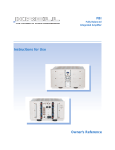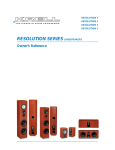Download Krell Industries 400 Stereo Amplifier User Manual
Transcript
EVOLUTION EVOLUTION 400, AMPLIFIERS 302 AND 403 THREE-CHANNEL 600, 402 AND OWNER’S STEREO 900 MONAURAL REFERENCE Evolution 302, 402, 403, 400, 600 and 900 Power Amplifiers Owner’s Reference, v08.0 Krell Industries, Inc. 45 Connair Road Orange, CT 06477-3650 USA TEL 203-298-4000 FAX 203-891-2028 E-MAIL [email protected] WEBSITE http://www.krellonline.com This product complies with the EMC directive (89/336/EEC) and the low-voltage directive (73/23/EEC). IMPORTANT SAFETY INSTRUCTIONS 1. Read Instructions. 2. Keep these Instructions. 3. Heed all Warnings. 4. Follow all Instructions. 5. Do not use this apparatus near water. 6. Clean only with a dry cloth. 7. Do not install near any heat sources such as radiators, heat registers, stoves, or other apparatus (including amplifiers) that produce heat. 8. Unplug this apparatus during lightning storms or when unused for long periods of time. 9. Refer all servicing to qualified service personnel. Servicing is required when the apparatus has been damaged in any way, such as a power-supply cord or plug is damaged, liquid has been spilled or objects have fallen into the apparatus, the apparatus has been exposed to rain or moisture, does not operate normally, or has been dropped. 10. An Evolution amplifier must be placed on a firm, level surface where it is not exposed to dripping or splashing. 11. The ventilation grids on the top of every Evolution amplifier, the ventilation grids on the back of the Evolution 302 and 400 amplifiers, and the space underneath every Evolution amplifier must be unobstructed at all times during operation. Do not place flammable material above or beneath an Evolution amplifier. 12. Before making connections to an Evolution amplifier, ensure that the power is off and other components are in mute or stand-by mode. Make sure all cable terminations are of the highest quality, free from frayed ends, short circuits, or cold solder joints. 13. THERE ARE NO USER SERVICEABLE PARTS INSIDE AN EVOLUTION AMPLIFIER. Please contact Krell if you have questions not addressed in this guide. This product is manufactured in the United States of America. Krell® is a registered trademark of Krell Industries, Inc., and is restricted for use by Krell Industries, Inc., its subsidiaries, and authorized agents. CAST™, Evolution CAST™, and Krell Current Mode™ are trademarks of Krell Industries, Inc. All other trademarks are registered to their respective companies. © 2007 by Krell Industries, Inc. All rights reserved . P/N 309888 Contents List of Illustrations, page 4 A Letter from Dan D’Agostino, page 5 SECTION ONE: Evolution Amplifier Features and Technology, page 6 Features, Revolutionary Krell CAST Technology, Definition of Terms SECTION TWO: Unpacking and Placement, page 11 Opening the Evolution Amplifier Shipping Carton SECTION THREE: Anatomy of the Evolution Amplifier, page 13 Front Panel Description, and Back Panel Description SECTION FOUR: Connecting an Evolution Amplifier to Your System, page 22 CAST Connections, Balanced Connections, Single-ended Connections, Evolution DC Protection Circuitry/Using Tube Preamplifiers, Connection Steps SECTION FIVE: Evolution Amplifier Operation, page 24 On/Off and Stand-by Operation SECTION SIX: Troubleshooting System Noise, page 25 How to Evaluate Amplifier Operation, Error Codes SECTION SEVEN: Questions and Answers, page 27 WARRANTY, page 28 RETURN AUTHORIZATION PROCEDURE, page 30 SPECIFICATIONS, page 31 3 List of Illustrations Figure 1, page 13 Evolution Amplifier Front Panel Figure 2, page 15 Evolution 302 Stereo Back Panel Figure 3, page 16 Evolution 402 Stereo Amplifier Back Panel Figure 4, page 17 Evolution 403 Three-channel Amplifier Back Panel Figure 5, page 18 Evolution 400 Monaural Amplifier Back Panel Figure 5, page 19 Evolution Monaural Amplifier Back Panel 4 A Letter from Dan D’Agostino Dear Audio Enthusiast, Thank you for your purchase of a Krell Evolution Series amplifier. Evolution Series amplifiers continue my quest for amplifiers that deliver absolute truth in music reproduction. Active Cascode Topology is a unique circuit technique that minimizes distortion by applying from 2 to 3 times more active devices to each gain stage. The attributes of this topology is shared throughout the Evolution Series amplifiers. Krell amplifiers are best known for their ability to drive any loudspeaker to sound its best, without regard to impedance or efficiency. I believe that linearity, an amplifier’s ability to output an exact duplicate of the input signal, is the ultimate measure of that amplifier’s work. At Krell, I drive amplifier designs toward the common goal of linearity, through the rigorous application of Krell design principles that focus our efforts on four major performance factors: distortion, bandwidth, output impedance, and current capability. The Evolution Series amplifiers are a synthesis of these factors. The Evolution Series amplifiers use Evolution CAST technology, for superior performance and very low noise. I hope that you enjoy your new Evolution Series amplifier. Sincerely, Daniel D’Agostino Chief Executive Officer 5 SECTION ONE Evolution Amplifier Features and Technology This section describes the innovative features and technology of the Evolution Series amplifiers, and defines CAST and other key terms used in this reference. There are six amplifier models in the Evolution Series: the 302 Stereo Power Amplifier, the 402 Stereo Power Amplifier, the 403 Three-channel Power Amplifier, the 400 Monaural Power Amplifier, the 600 Monaural Power Amplifier, and the 900 Monaural Power Amplifier. The compact chassis of the 400 Monaural Power Amplifier contains all of the high power, wide bandwidth, and low noise characteristics designed into all Evolution Series amplifiers. Features Evolution Series amplifiers are designed with a signal path that incorporates Krell Current Mode and CAST circuitry. All amplifiers feature massive power supplies. The power supply makes use of extensive electrical and magnetic shielding to keep radiated interference out of critical amplifier circuits. The Evolution 302 design utilizes a 3000 VA power supply. The Evolution 402 and Evolution 600 are equipped with a 5000 VA power supply, and the Evolution 403 and Evolution 900 house 6000 VA power supplies. Internal high-current line conditioning circuitry filters RF noise on the AC mains, as well as compensating for asymmetrical power waveforms and DC on the mains. Advanced microprocessor control monitors critical operational parameters. Output current, DC offset, rail voltages, and operating temperature are all continuously monitored. 6 Revolutionary Krell CAST Technology Current Audio Signal Transmission, termed CAST, is a revolutionary method of connecting analog audio components for unparalleled sonic performance. Innovative engineering combines the new Krell CAST circuitry with existing Krell Current Mode technology to create entire CAST systems that reproduce music with incredible range, tonality, and precision. The Voltage Signal Transmission and the Traditional Audio System Traditionally, signal is transmitted in the voltage domain between two components. In an audio system, each component is a discrete entity with unique characteristics that act upon the musical signal independently. Each component is unaware of the other components in the system. The cables that connect the components also have their own electrical characteristics, which affect the sonic presentation of the entire system. CAST transmission unifies individual components and interconnects into an electrically-linked whole. The original signal remains unaltered from source to speaker. CAST Basics Here is how a CAST audio system works. Internally, each CAST source transfers, or amplifies, current using Krell Current Mode circuitry. This current signal is then output using CAST circuitry. When the signal is received by a CAST input, Krell Current Mode circuitry again takes over until the signal reaches the loudspeaker. By maintaining the musical signal in the current domain from beginning to end, an entire CAST system behaves as if it is one component. With CAST, circuit board properties and signal transmission aberrations between components are eliminated. Cable impedances and their effects on the transmitted signal are non-existent. How CAST and Krell Current Mode Interact While CAST is a new method of transferring the musical signal between components, its origin stems from Krell Current Mode, the technology developed to transfer the musical signal within a component. CAST combined with Krell Current Mode circuitry takes signal transmission to the next evolutionary level. In essence, 7 continued (SECTION ONE: Evolution Amplifier Features and Technology continued) Krell Current Mode maintains the integrity of the signal within the component and CAST preserves the transmitted signal between components. Together, CAST and Krell Current Mode technologies unify separate Krell components into a single global circuit. Krell Current Mode technology enjoys bandwidth increases up to an order of magnitude greater than their voltage based counterparts. This dramatic increase in circuit bandwidth delivers near perfection in the audible band that typically suffers from phase distortions in voltage circuits. CAST Cable Construction A CAST system uses cables manufactured by Krell and other manufacturers specially licensed by Krell. Thin and flexible CAST cables are constructed with the same build quality as other Krell components and are aesthetically matched to the components that Krell manufactures. An all-metal body and locking connectors with gold contacts are part of the standard no-compromise specification developed for every CAST cable made. Evolution CAST By employing revolutionary current mirror circuitry, the Evolution amplifier components raises CAST technology to another level. This advanced use of the technology increases the linearity, transient speed, and bandwidth of the Evolution components while reducing the distortion by an order of magnitude. The Best Musical Performance When you operate a CAST system, you will hear significant improvements in every performance area: speed, precision, dynamic range, depth and width of the sound stage, transient impact, tonal balance, harmonic distortion, and more. The goal for CAST is the same company goal used for all Krell products. Krell strives for the delivery of the best performance of a musical event for you, using the full expression of technology to date. 8 Definition of Terms The following are definitions of key terms used in this owner’s reference: Inputs and Outputs Balanced A symmetrical input or output circuit that has equal impedance from both input terminals to a common ground reference point. The industry standard for professional and sound recording installations, balanced connections have 6 dB more gain than single-ended connections and allow the use of long interconnect cables. Balanced connections are completely immune to induced noise from the system or the environment. CAST and Evolution CAST Krell Current Audio Signal Transmission, or CAST, is a proprietary Krell circuit technology for connecting analog components, transmitting the audio waveform between components in the current domain rather than in the voltage domain. The speed and bandwidth provided by Krell CAST and its circuitry update, Evolution CAST, yield accurate, realistic music reproduction, enabling connected components to perform as if they are all part of a single circuit. CAST and Evolution CAST are balanced connections, and reject induced noise. Single-ended A two-wire input or output circuit. Single-ended connections are not recommended for connections requiring long cable runs. Use care when using single-ended connections, because the ground connection is made last and broken first. Turn the system off/on prior to making or breaking single-ended connections. Operation Off When the power status indicator is not illuminated, the amplifier is off. Stand-by A low-power-consumption status that keeps the audio and power supply circuits at idle. The power status indicator is illuminated in red, when the amplifier is in stand-by mode. Krell recommends leaving the amplifier in stand-by mode when it is not playing music. Operation When the power button is pressed, and the power status indicator is illuminated in blue, the amplifier is in operational mode and ready to play music. 9 continued (SECTION ONE: Definition of Terms continued) Technology Active Cascode Topology A unique circuit technique that minimizes distortion by applying from 2 to 3 times more active devices to each gain stage thereby reducing the load on individual devices and improving circuit-wide linearity. Krell Current Mode A proprietary Krell circuit topology in which the audio gain stages of a component operate in the current domain rather than the voltage domain. This unique technology provides the component with exceptional speed, and a wide bandwidth. 10 TWO SECTION Unpacking and Placement This section describes the procedures for safely unpacking and placing your Evolution amplifier. The amplifier and accessories are shipped in 1 carton. The dimensions of the amplifier are shown in the specifications section starting on page 31. Two people are needed to remove the Evolution amplifier from its shipping box safely and easily. Opening the Evolution Amplifier Shipping Carton 1. Open the shipping carton and remove the top layer of foam. The carton contains these items: 1 Evolution amplifier chassis 1 20 amp AC power cord 1 12 VDC (12 V trigger) cable 1 Packet containing the Quick Setup Guide and the warranty registration card 2. Orient the shipping box so that one person stands at the front of the amplifier and one person stands at the back of the amplifier. Both people need to grab a pair of the cardboard handle cutouts (one pair located at the front of the amplifier and one pair located at the back of the amplifier) and simultaneously lift the amplifier straight up, out of the carton. Bend and lift with your knees, not your back. 3. Place the amplifier in a safe location, and remove the protective plastic wrapping. Note Save all packing materials. If you need to ship the Evolution amplifier in future, repack the unit in its original packaging to prevent shipping damage. 11 continued (SECTION TWO: Unpacking and Placement continued) Placement Before you install an Evolution amplifier into your system, please follow the guidelines in this section to select a location for your component. This will facilitate a clean, trouble-free installation. Place the amplifier on a firm, level surface, away from excessive heat, humidity, or moisture. Each Evolution amplifier requires at least two inches (5 cm) of clearance on each side and at least eight inches (20 cm) of clearance above the component to provide adequate ventilation. If you place the amplifier in a closed cabinet, you may need to modify shelf spacing or use small fans to increase ventilation. When the front and back of a cabinet are open, the air space between the chassis and shelf must be unobstructed. Place the amplifier(s) as close to the loudspeakers as possible. While Evolution CAST technology permits long interconnect cable lengths, keep loudspeaker cable lengths to a minimum. AC Power Guidelines The Evolution amplifier requires a dedicated AC circuit rated at a minimum of 20 amps. Do not use extension cords, multiple AC adapters, or AC power strips. Note Do not operate the Evolution amplifiers with any device designed to alter or condition AC power. 12 SECTION THREE Anatomy of an Evolution Amplifier This section describes Evolution amplifier functions. Figure 1 Evolution Amplifier Front Panel (Evolution 402 shown) Power 1 Power Button 2 Power Status Indicator 13 continued (SECTION THREE: Anatomy of an Evolution Amplifier continued) Front Panel Description See Figure 1 on the previous page Evolution amplifier front panel functions are described below: Power 1 Power Button Press this button to place the Evolution amplifier in operational mode. 2 Power Status Indicator The power status indicator is illuminated in red when the amplifier is in standby mode. The indicator illuminates in blue when the amplifier is in operational mode. If there is no illumination, please check the following items: —The power cord is connected to the amplifier —The power cord is plugged into a live AC power supply —The back panel power breaker switch (10) is set to the on position —The back panel backlight switch (8) is set to the on/ext position —There is no 12 VDC controller connected to the EXT IN connector 14 Figure 2 Evolution 302 Stereo Amplifier Back Panel Outputs Inputs Remote Power 3 4 5 6 7 8 9 10 Loudspeaker Binding Posts CAST Inputs Single-ended Inputs Balanced Inputs 12 VDC Out/In (12 V Trigger) Backlight Control IEC Power Cord Receptacle Power Breaker Switch 15 continued Figure 3 Evolution 402 Stereo Amplifier Back Panel Outputs Inputs Remote Power 3 4 5 6 7 8 9 10 Loudspeaker Binding Posts CAST Inputs Single-ended Inputs Balanced Inputs 12 VDC Out/In (12 V Trigger) Backlight Control IEC Power Cord Receptacle Power Breaker Switch 16 (SECTION THREE: Anatomy of an Evolution Amplifier continued) Figure 4 Evolution 403 Multi-channel Amplifier Back Panel Outputs Inputs Remote Power 3 4 5 6 7 8 9 10 Loudspeaker Binding Posts CAST Inputs Single-ended Inputs Balanced Inputs 12 VDC Out/In (12 V Trigger) Backlight Control IEC Power Cord Receptacle Power Breaker Switch 17 continued Figure 5 Evolution 400 Monaural Amplifier Back Panel Outputs Remote Power 3 4 5 6 7 8 9 10 Loudspeaker Binding Posts CAST Input Single-ended Input Balanced Input 12 VDC Out/In (12 V Trigger) Backlight Control IEC Power Cord Receptacle Power Breaker Switch 18 Figure 6 Evolution Monaural Amplifier Back Panel (Evolution 600 shown) Outputs Inputs Remote Power 3 4 5 6 7 8 9 10 Loudspeaker Binding Posts CAST Input Single-ended Input Balanced Input 12 VDC Out/In (12 V Trigger) Backlight Control IEC Power Cord Receptacle Power Breaker Switch 19 (SECTION THREE: Anatomy of an Evolution Amplifier continued) Back Panel Description See Figures 2, 3, 4, 5, and 6 on the previous pages The amplifier back panel provides access to the input and output connections, 12 V trigger inputs and outputs, and the AC power connection and switch. Back panel features and their descriptions follow: Outputs 3 Loudspeaker Binding Posts (one pair per channel) Each channel has one positive and one negative binding post. They accept spade lugs only. Inputs 4 CAST Inputs (one per channel) These are CAST inputs with 4-pin bayonet connectors, for use with Krell CAST-equipped preamplifiers and components. 5 Single-ended Inputs (one per channel) These are single-ended analog inputs with RCA connectors. 6 Balanced Inputs (one per channel) These are balanced analog inputs with XLR connectors. 20 continued Remote Connections 7 12 VDC In/Out (12 V Trigger) The 12 V trigger allows you to turn the Evolution amplifier on or to stand-by from other components. Out. The output sends 12 VDC (12 V trigger) power on/off signals to other Krell components and other devices that incorporate a 12 V trigger, allowing whole systems or parts of systems to be easily controlled remotely. Mono 3.5 mm connectors are used in the following configuration: Tip = +12 V, Sleeve = GND. Notes When an Evolution amplifier is in the operational mode, the 12 V trigger provides 12 Volts of DC output. When the amplifier is in the stand-by mode or off, the DC output is 0 Volts. A maximum of 30 mA is available from the 12 V trigger output. Consult the owner's reference of the components used in a custom installation to take full advantage of the remote capabilities of an Evolution amplifier. 8 Backlight Control Ext In. Connect a 12 V trigger to the Ext In input connector to turn off the power status indicator (2) using a remote control. The switch must be set to On/Ext, in order for this to function (see below). On/Ext. This activates the power status indicator. (This is the factory default position.) Off. This turns off the power status indicator, during normal operation. The power status indicator remains illuminated for ten seconds after the power button is pressed. Power 9 IEC Power Cord Receptacle The power receptacle is for use with the provided 20 amp AC power cord. Use only the power cord supplied with your Evolution amplifier. 10 Power Breaker Switch Place this switch in the up position to put the amplifier in stand-by mode. Place the switch in the down position to turn off the amplifier. 21 SECTION FOUR Connecting an Evolution Amplifier to Your System This section describes Evolution amplifier connections. Each Evolution amplifier channel has a CAST 4-pin connector, a balanced input via an XLR connector, a single-ended RCA connector, and a pair of loudspeaker binding posts. The rear panel also has 12 VDC trigger input and outputs, and a backlight remote trigger input. All inputs and outputs are located on the Evolution amplifier back panel. Maintain the correct left/right orientation, when hooking up your system. CAST Connections Krell recommends using its proprietary Krell CAST system for unparalleled sonic performance for connections between the Evolution amplifier and other CASTequipped components. Krell CAST uses flexible interconnecting cables that can be drawn through tight spaces and concealed. Balanced Connections The Evolution amplifier also offers balanced operation. The circuitry and connections associated with balanced operation not only can minimize sonic loss but also are immune to induced noise, especially for installations using long cables. XLR Pin Configuration Pin 1 Pin 2 Pin 3 Ground Non-inverting (0 ) (hot) Inverting (180 ) (cold) O O Single-ended Connections Each Evolution amplifier channel has one single-ended input. If connecting a vacuum tube preamplifier, use the single-ended inputs only (see below). Connect the u-shaped jumpers between pins 1 and 3 of the XLR connectors when using single-ended inputs. 22 continued Evolution DC Protection Circuitry/Using Tube Preamplifiers The high DC output of tube preamplifiers may exceed the active DC protection circuitry of the Evolution amplifiers. Excessive DC level in a signal can damage amplifiers, loudspeakers, or both. The single-ended inputs of the Evolution amplifiers are capacitor-coupled and DC does not pass through. Therefore, if connecting a tube preamplifier, use the single-ended inputs only. For more information about DC protection circuitry features, see Error Codes on page 26. Connection Steps Position the amplifier where you intend to use it in your system. The following steps describe how to connect an Evolution amplifier to your system: 1. Turn off all power sources and components before connecting inputs and outputs. 2. Neatly arrange and organize wiring to and from the Evolution amplifier and all components. Separate AC wires from audio cables to prevent hum or other unwanted noise from being introduced into the system. 3. Connect the outputs of your preamplifier to the appropriate CAST (4), balanced (6), or single-ended inputs (5) on the Evolution amplifier. Note Connect the u-shaped jumpers between pins 1 and 3 of the XLR connectors when using single-ended inputs. 4. Connect the loudspeaker cables to the loudspeaker binding posts (7) on the Evolution amplifier. The binding posts accept spade lugs only. Take care to observe the correct polarity when making connections: The positive (+) output connects to the positive input of the loudspeaker. The negative (-) output connects to the negative input of the loudspeaker. 5. Connect the supplied AC power cord to the AC power cord receptacle (9). 6. Plug the AC power cord into AC power. Note Use only the power cord provided with the Evolution amplifier to make the connection to AC power. Operation with a power cord other than the one supplied by Krell could induce noise, limit current, or otherwise impair the ability of the amplifier to perform optimally. 23 SECTION FIVE Evolution Amplifier Operation The Evolution amplifiers are easy to operate. IMPORTANT When powering up any system, turn the amplifier on last. When powering down, turn it off first. This will prevent any turn-on and turn-off thumps in your loudspeakers. Always mute or fully attenuate the preamplifier level when switching sources. Do not change input connections to the amplifier when the amplifier is on. Krell amplifiers have large reserves of clean power that can safely drive loudspeakers to higher sound pressure levels than other amplifiers. Use care when setting high playback levels, and lower the volume level at the first sign of loudspeaker distress. On/Off and Stand-by Operation 1. Move the back panel power breaker switch (10) to the up position to place the amplifier in stand-by mode. The power status indicator (2) illuminates in red. 2. Press the silver power button (1) on the amplifier front panel. The power status indicator (2) illuminates in blue. The initial power-up phase lasts approximately 30 seconds from the moment the back panel power breaker switch is placed in the up position. If the power button is pressed during this period, the power status indicator flashes blue for the remainder of the initial power-up phase. When the initial power-up phase is complete, the power indicator illuminates in blue and is no longer flashing. The amplifier is in the operational mode. 3. With the preamplifier muted or its volume completely lowered, select a source. 4. Increase the volume control to the desired listening level. 5. To return the amplifier to stand-by, press the power button on the front panel. The power status indicator turns red, and the amplifier is in the stand-by mode. It is now safe to place the rest of the system in stand-by. Powering Off Krell recommends leaving Evolution amplifiers in the stand-by mode between listening sessions. Turn the amplifier off using the power breaker switch (10), and disconnect the amplifier from AC power when the system is not being used for an extended period of time. 24 SECTION SIX Troubleshooting System Noise AC grounding becomes critical when connecting high-performance audio components. When you mix and match high-performance audio components, each with its own ground potential, a low frequency hum may occur in one or both loudspeakers. This often occurs when introducing a new component into a system. If this happens when you place the Evolution amplifier into your system, follow these simple troubleshooting steps. Note During these steps, the back panel power breaker switch remains in the on position. 1. Check that all input and output connections are of sound construction. 2. With the amplifier in stand-by mode, remove the interconnect cables, then turn the amplifier on. If the hum disappears, turn the amplifier into stand-by mode again, and reinsert one of the interconnect cables. Turn the amplifier back on. Repeat this process for each cable. 3. If the hum reappears with one or both interconnect cables reinserted, the cable needs to be checked. 4. If the interconnect cables are sound, you may be experiencing a ground loop. Please contact your authorized Krell dealer, distributor, or Krell for suggestions on how to eliminate the ground loop. How to Evaluate Amplifier Operation The amplifiers are protected by a series of non-intrusive circuits that constantly evaluate the amplifier’s operation. This circuitry protects against damaging DC input or output, and short circuits. The protection circuitry in an Evolution amplifier is designed to prevent damage to the amplifiers or loudspeakers caused by other defective components, faulty wiring, system mishandling, or amplifier failure. 25 (SECTION SIX: Troubleshooting continued) Error Codes In the event of a problem, the power status indicator (2) will flash error code(s) in red. Errors are identified by a sequence of 3, 4, or 5 flashes. There is a pause between codes, and in the case where there is only one error code, the same code is repeated. Diagnostic Code Possible Condition Course of Action 3 flashes Excessive current draw Check loudspeaker and cables for short circuits. If you are driving more than one loudspeaker per channel, check that the combined load does not drop below 2 Ohms. The power breaker switch must be shut off to reset the fault condition. 4 flashes Excessive temperature Allow the amplifier to cool, and increase ventilation. If the problem persists, please call the factory. 5 flashes Excessive DC at input Check the preamplifier output and source outputs for excessive DC voltage. If you are using a vacuum tube preamplifier, use only the single-ended inputs, as they are capacitor coupled. 26 SECTION SEVEN Questions and Answers Q. Should I leave my Evolution amplifier on at all times? A. For maximum amplifier performance, leave the back panel power breaker switch on at all times. This places the amplifier in stand-by mode. Evolution amplifiers are designed to be powered on and off from stand-by, using the front panel power button. This eliminates “cold start” degradation. The amplifier will operate at full performance within minutes. Q. When I turn on the amplifier there is a loud hum through the loudspeakers. What should I do? A. When a new component is introduced, a low frequency hum may occur in one or both loudspeakers. Check all input and output connections and cables, making sure they are of sound construction. See Troubleshooting System Noise, on page 25. If the interconnects and cables are sound, you may be experiencing a ground loop. This can often be easily eliminated. Please contact your authorized Krell dealer, distributor, or Krell for suggestions on how to solve this problem. Q. My loudspeakers are rated for 150 Watts. Are the Evolution models too powerful for them? A. No. A loudspeaker seldom is damaged from overdriving. More often, damage occurs when an amplifier that lacks sufficient power is asked to handle heavy demand situations such as high playback levels. These amplifiers may have very high 8 Ohm power ratings, but in heavy demand situations they can be driven into clipping (in which high power, high frequency harmonics go to the loudspeakers, due to loss of amplifier power). Clipping can damage loudspeakers. Avoid damage to your loudspeakers by reviewing your loudspeaker’s specifications, and exercise caution in heavy demand situations. 27 Warranty Krell products have a limited warranty. Amplifiers, preamplifiers, preamp/processors, and receivers carry a limited warranty of five years for parts and labor on circuitry. Loudspeakers carry a limited warranty of five years for parts and labor. CD and DVD players carry a limited warranty of five years for parts and labor on circuitry, and three years for parts and labor on mechanical parts. Should the product fail to perform at any time during the warranty, Krell will repair it at no cost to the owner, except as set forth in this warranty. This warranty does not apply to damage caused by acts of God or nature. This warranty shall be in lieu of any other warranty, expressed or implied, including, but not limited to, any implied warranty of merchantability or fitness for a particular purpose. There are no warranties which exceed beyond those described in this document, if the product does not perform as warranted herein, the owner’s sole remedy shall be repair. In no event will Krell be liable for incidental or consequential damages arising from purchase, use, or inability to use the product, even if Krell has been advised of the possibility of such damages. IMPORTANT The single-ended inputs on the Evolution amplifiers are cap-coupled. Use these inputs whenever you are connecting a tube preamplifier. Proof of purchase in the form of a bill of sale or receipted invoice substantiating that the product is within the warranty period must be presented to obtain warranty service. The warranty begins on the date of the original retail purchase, as noted on the bill of sale or receipted invoice from an authorized Krell dealer or distributor. Previously owned equipment, when re-purchased from an authorized Krell dealer or distributor, has the balance of the original warranty, based on the original date of manufacture. Krell dealers and distributors are not authorized to sell current products on the Internet. Current products purchased via the Internet do not have any transferrable warranty. The warranty for a Krell product is valid only in the country to which it was originally shipped, through the authorized Krell distributor for that country, and at the factory. There may be restrictions on or changes to the Krell warranty because of regulations within a specific country. Please check with your distributor for a complete understanding of the warranty in your country. 28 continued If the product is serviced by a distributor who did not import the unit, there may be a charge for service, even if the product is within the warranty period. Freight to the factory is your responsibility. Return freight within the United States (U.S.A.) is included in the warranty. If you have purchased your Krell product outside the U.S.A. and wish to have it serviced at the factory, all freight and associated charges to the factory are your responsibility. Krell will pay return freight to the U.S.A.-based freight forwarder of your choice. Freight and other charges to ship the product from the freight forwarder to you are also your responsibility. Krell is not responsible for any damage incurred in transit. Krell will file claims for damages as necessary for a product damaged in transit to the factory. You are responsible for filing claims for shipping damages during the return shipment. Krell does not supply replacement parts and/or products to the owner of the product. Replacement parts and/or products will be furnished only to the distributor performing service on this product on an exchange basis only; any parts and/or products returned to Krell for exchange become the property of Krell. No expressed or implied warranty is made for any Krell product damaged by accident, abuse, misuse, natural or personal disaster, or unauthorized modification. Any unauthorized voltage conversion, disassembly, component replacement, perforation of chassis, updates, or modifications performed to the product will void the warranty. The operating voltage of the product is determined by the factory and can only be changed by an authorized Krell distributor or at the factory. The voltage for this product in the U.S.A. cannot be changed until six months from the original purchase date. In the event that Krell receives a product for warranty service that has been modified in any way without Krell authorization, all warranties on that product will be void. The product will be returned to original factory layout specifications at the owner’s expense before it is repaired. All repairs required after the product has been returned to original factory specifications will be charged to the customer, at current parts and labor rates. All operational features, functions, and specifications and policies are subject to change without notification. To register your product for warranty benefits, please complete and return the Warranty Registration Card enclosed in the shipping box within 15 days of purchase. Thank you. 29 Return Authorization Procedure How to Expedite Service If you believe there is a problem with your component, please contact your dealer, distributor, or the Krell factory to discuss the problem before you return the component for repair. To expedite service, you may wish to complete and e-mail the Service Request Form in the Service section of our website at: http://www.krellonline.com To contact the Krell Service Department: TELL FAX E-MAIL 203-298-4020, Monday-Friday 9:00 AM to 5:00 PM EST 203-795-2287 [email protected] WEBSITE http://www.krellonline.com How to Return a Product To return a product to Krell, please follow this procedure so that we may serve you better: 1. Obtain a Return Authorization Number (R/A number) and shipping address from the Krell Service Department. 2. Insure and accept all liability for loss or damage to the product during shipment to the Krell factory and ensure that all freight (shipping) charges are prepaid. The product may also be hand delivered if arrangements with the Service Department have been made in advance. Proof of purchase will be required for warranty validation at the time of hand delivery. IMPORTANT Use the original packaging to ensure the safe transit of the product to the factory, dealer, or distributor. Krell may, at its discretion, return a product in new packaging and bill the owner for such packaging if the product received by Krell was boxed in nonstandard packaging or if the original packaging was so damaged that it was unusable. If Krell determines that new packaging is required, the owner will be notified before the product is returned. How to Purchase Additional Packing To purchase additional packing, please contact your authorized Krell dealer, distributor, or the Krell Service Department for assistance. 30 Specifications Measurement Evolution 302 Stereo Amplifier Evolution 402 Stereo Amplifier FREQUENCY RESPONSE 20 Hz to 20 kHz +0, –0.10 dB <0.5 Hz to 180 kHz +0, –3 dB 20 Hz to 20 kHz +0, –0.18 dB <0.5 Hz to 120 kHz +0, –3 dB Wideband, unweighted, referred to full power output “A” weighted >107 dB >106 dB >117 dB >116 dB GAIN 25.5 dB 25.4 dB TOTAL HARMONIC DISTORTION <0.02% at 1 kHz, at 300 W, 8 Ohms <0.02% at 1 kHz, at 400 W, 8 Ohms <0.15% at 20 kHz, at 300 W, 8 Ohms <0.15% at 20 kHz, at 400 W, 8 Ohms SIGNAL-TO-NOISE RATIO INPUT IMPEDANCE 100 kOhms 200 kOhms 75 Ohms 100 kOhms 200 kOhms 70 Ohms Single-ended or balanced CAST 2.60 V rms 2.60 mA rms 3.04 V rms 3.04 mA rms OUTPUT POWER 300 W rms at 8 Ohms 600 W rms at 4 Ohms 1200 W rms at 2 Ohms 400 W rms at 8 Ohms 800 W rms at 4 Ohms 1600 W rms at 2 Ohms 139 V peak-to-peak 49 V rms 160 V peak-to-peak 57 V rms Single-ended Balanced CAST INPUT SENSITIVITY All channels driven OUTPUT VOLTAGE OUTPUT CURRENT 35 A peak 37 A peak SLEW RATE 120 V/µs 100 V/µs OUTPUT IMPEDANCE <0.040 Ohms at 20 Hz <0.053 Ohms, 20 Hz to 20 kHz <0.055 Ohms at 20 Hz <0.064 Ohms, 20 Hz to 20 kHz DAMPING FACTOR >200 at 20 Hz >150, 20 Hz to 20 kHz >145 at 20 Hz >125, 20 Hz to 20 kHz 150 W 320 W 3400 W 370 W 570 W 3800 W Stand-by Idle Maximum 510 BTU/hr. 1100 BTU/hr. 5500 BTU/hr. 890 BTU/hr. 1300 BTU/hr. 6400 BTU/hr. INPUTS 2 single-ended via RCA connector 2 balanced via XLR connector 2 CAST via 4-pin bayonet connector 2 single-ended via RCA connector 2 balanced via XLR connector 2 CAST via 4-pin bayonet connector OUTPUTS 2 pairs Krell binding posts 2 pairs Krell binding posts DIMENSIONS 17.3 in. W x 9.8 in. H x 20.7 in. D 438 mm W x 248 mm H x 525 mm D 17.3 in. W x 9.8 in. H x 22.1 in. D 438 mm W x 248 mm H x 550 mm D 138 lb., 62.4 kg 120 lb., 54.3 kg 150 lb., 67.9 kg 135 lb., 61.1 kg Referred to 8 Ohms POWER CONSUMPTION Stand-by Idle Maximum HEAT OUTPUT WEIGHT Shipping Unit only All operational features, functions, specifications, and policies are subject to change without notification. 31 (Specifications continued) Measurement Evolution 403 3-channel Amplifier FREQUENCY RESPONSE 20 Hz to 20 kHz +0, –0.18 dB <0.5 Hz to 120 kHz +0, –3 dB Evolution 400 Monaural Amplifier SIGNAL-TO-NOISE RATIO Wideband, unweighted, referred to full power output “A” weighted >106 dB GAIN 25.4 dB TOTAL HARMONIC DISTORTION <0.02% at 1 kHz, at 400 W, 8 Ohms <0.15% at 20 kHz, at 400 W, 8 Ohms >116 dB INPUT IMPEDANCE Single-ended Balanced CAST 100 kOhms 200 kOhms 70 Ohms INPUT SENSITIVITY Single-ended or balanced CAST 3.04 V rms 3.04 mA rms OUTPUT POWER 400 W rms at 8 Ohms 800 W rms at 4 Ohms 1600 W rms at 2 Ohms OUTPUT VOLTAGE 160 V peak-to-peak 57 V rms OUTPUT CURRENT 37 A peak SLEW RATE 100 V/µs OUTPUT IMPEDANCE <0.055 Ohms at 20 Hz <0.064 Ohms, 20 Hz to 20 kHz DAMPING FACTOR >145 at 20 Hz >125, 20 Hz to 20 kHz Referred to 8 Ohms POWER CONSUMPTION Stand-by Idle Maximum 370 W 570 W 5000 W HEAT OUTPUT Stand-by Idle Maximum 1270 BTU/hr. 1950 BTU/hr. 7700 BTU/hr. INPUTS 3 single-ended via RCA connector 3 balanced via XLR connector 3 CAST via 4-pin bayonet connector OUTPUTS 3 pairs Krell binding posts DIMENSIONS 17.3 in. W x 9.8 in. H x 26.1 in. D 438 mm W x 248 mm H x 662 mm D WEIGHT Shipping Unit only 190 lb., 86 kg 175 lb., 79.2 kg All operational features, functions, specifications, and policies are subject to change without notification. continued 32 (Specifications continued) Measurement Evolution 600 Monaural Amplifier Evolution 900 Monaural Amplifier FREQUENCY RESPONSE 20 Hz to 20 kHz +0, –0.18 dB <0.5 Hz to 120 kHz +0, –3 dB 20 Hz to 20 kHz +0, –0.18 dB <0.5 Hz to 120 kHz +0, –3 dB Wideband, unweighted, referred to full power output “A” weighted >110 dB >113 dB >119 dB >122 dB GAIN 25.4 dB 25.4 dB TOTAL HARMONIC DISTORTION <0.02% at 1 kHz, at 600 W, 8 Ohms <0.02% at 1 kHz, at 900 W, 8 Ohms <0.15% at 20 kHz, at 600 W, 8 Ohms <0.15% at 20 kHz, at 900 W, 8 Ohms SIGNAL-TO-NOISE RATIO INPUT IMPEDANCE 100 kOhms 200 kOhms 70 Ohms 100 kOhms 200 kOhms 70 Ohms Single-ended or balanced CAST 3.72 V rms 3.72 mA rms 4.55 V rms 4.55 mA rms OUTPUT POWER 600 W rms at 8 Ohms 1200 W rms at 4 Ohms 2400 W rms at 2 Ohms 900 W rms at 8 Ohms 1800 W rms at 4 Ohms 3600 W rms at 2 Ohms OUTPUT VOLTAGE 196 V peak-to-peak 69 V rms 240 V peak-to-peak 85 V rms Single-ended Balanced CAST INPUT SENSITIVITY OUTPUT CURRENT 49 A peak 60 A peak SLEW RATE 100 V/µs 90 V/µs OUTPUT IMPEDANCE <0.030 Ohms, 20 Hz to 20 kHz <0.023 Ohms, 20 Hz to 20 kHz DAMPING FACTOR >270, 20 Hz to 20 kHz >350, 20 Hz to 20 kHz 260 W 410 W 3800 W 440 W 650 W 5000 W Stand-by Idle Maximum 890 BTU/hr. 1400 BTU/hr. 5500 BTU/hr. 1500 BTU/hr. 2200 BTU/hr. 7700 BTU/hr. INPUTS 1 single-ended via RCA connector 1 balanced via XLR connector 1 CAST via 4-pin bayonet connector 1 single-ended via RCA connector 1 balanced via XLR connector 1 CAST via 4-pin bayonet connector OUTPUTS 1 pair Krell binding posts 1 pair Krell binding posts DIMENSIONS 17.3 in. W x 9.8 in. H x 22.1 in. D 17.3 in. W x 9.8 in. H x 26.1 in. D 438 mm W x 248 mm H x 560 mm D 438 mm W x 248 mm H x 662 mm D Referred to 8 Ohms POWER CONSUMPTION Stand-by Idle Maximum HEAT OUTPUT WEIGHT Shipping Unit only 150 lb., 67.9 kg 135 lb., 61.1 kg 190 lb., 86 kg 175 lb., 79.2 kg All operational features, functions, specifications, and policies are subject to change without notification. 33 EVOLUTION 400, AMPLIFIERS 302 AND 403 THREE-CHANNEL 600, 402 AND OWNER’S STEREO 900 MONAURAL REFERENCE V08.0 KRELL 45 INDUSTRIES, CONNAIR ORANGE, TELL: CT 06477-3650 203-298-4000 E-MAIL: INC. ROAD • FA X : USA 203-891-2028 [email protected] h t t p : / / w w w. k r e l l o n l i n e . c o m











































